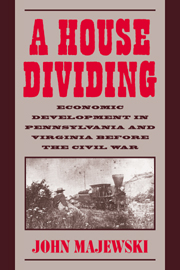Book contents
- Frontmatter
- Contents
- List of Tables
- List of Abbreviations
- Acknowledgments
- Maps
- Introduction: Regional Development in Comparative Perspective
- 1 Developmental Corporations in a Slave-Labor Society
- 2 Developmental Corporations in a Free-Labor Society
- 3 Railroads and Local Development
- 4 The Local Politics of Market Development
- 5 Urban Capital and the Superiority of Pennsylvania's Transportation Network
- 6 Why Antebellum Virginians Never Developed a Big City: Comparative Urban Development in Philadelphia and Eastern Virginia
- Epilogue: Railroad Networks and the Civil War
- Appendix on Sources and Methods
- Bibliography
- Index
5 - Urban Capital and the Superiority of Pennsylvania's Transportation Network
Published online by Cambridge University Press: 07 September 2010
- Frontmatter
- Contents
- List of Tables
- List of Abbreviations
- Acknowledgments
- Maps
- Introduction: Regional Development in Comparative Perspective
- 1 Developmental Corporations in a Slave-Labor Society
- 2 Developmental Corporations in a Free-Labor Society
- 3 Railroads and Local Development
- 4 The Local Politics of Market Development
- 5 Urban Capital and the Superiority of Pennsylvania's Transportation Network
- 6 Why Antebellum Virginians Never Developed a Big City: Comparative Urban Development in Philadelphia and Eastern Virginia
- Epilogue: Railroad Networks and the Civil War
- Appendix on Sources and Methods
- Bibliography
- Index
Summary
Some time in the 1850s John Hartwell Cocke, the James River planter who had worked so hard to improve Virginia's transportation network, sat down to scribble a few “Notes on Starting a Great Commercial City.” Cocke sought to demonstrate that a “point of land forming the northern bank of [the] James River at its entrance into Hampton Roads” could become the site of a grand metropolis that would dominate the trade of America's Atlantic coast. He predicted that with a little courage and enterprise “[a] city will spring up at the mouth of [the] James River – which for rapidity of growth 8c accumulation of wealth will ecliyspe [sic] the famed History of St. Louis and Chicago.” Even by the rather generous standards of nineteenth-century American boosterism, Cocke's effort to show how Virginians could build a port that would quickly surpass New York and Philadelphia bordered on the ridiculous. The location for his great commercial city, he freely admitted, was nothing more than “a barren promontory without a house.” All of the city's infrastructure would have to be built from scratch, along with several rail and canal connections that would link it to the Ohio Valley. Nor did Cocke have a clear idea of how Virginians could finance such a venture other than to assert vaguely that “we are likely to engage foreign capital.” No wonder that Cocke's notes remained safely tucked away in his papers, never to see widespread circulation.
- Type
- Chapter
- Information
- A House DividingEconomic Development in Pennsylvania and Virginia Before the Civil War, pp. 111 - 140Publisher: Cambridge University PressPrint publication year: 2000



